- Air pollution is responsible for 29,000 premature deaths a year in Britain
- London has by far the worst air pollution problem in the country
- Good Health and King's College London gave 6 people air pollution monitors
- They recorded levels of black carbon in subjects' surrounding environment
We all know about the perils of smoking, drinking, overeating and sitting for too long. But we're less cautious about another, less visible killer: air pollution.
Yet increasingly studies are showing that microscopic pollutant particles in the air, generated by petrol and particularly diesel engines and other man-made sources, can have serious health effects.
Air pollution is responsible for 29,000 premature deaths a year in Britain - ten times the number of people killed in road accidents - according to a review by the Government's scientific advisory group, the Committee on the Medical Effects of Air Pollutants. Read more: http://www.dailymail.co.uk/health/article-2639878/Is-air-pollution-poisoning-body-Tiny-particles-pollution-air-breathe-blamed-thousands-deaths-year-This-test-reveals-whos-risk.html









